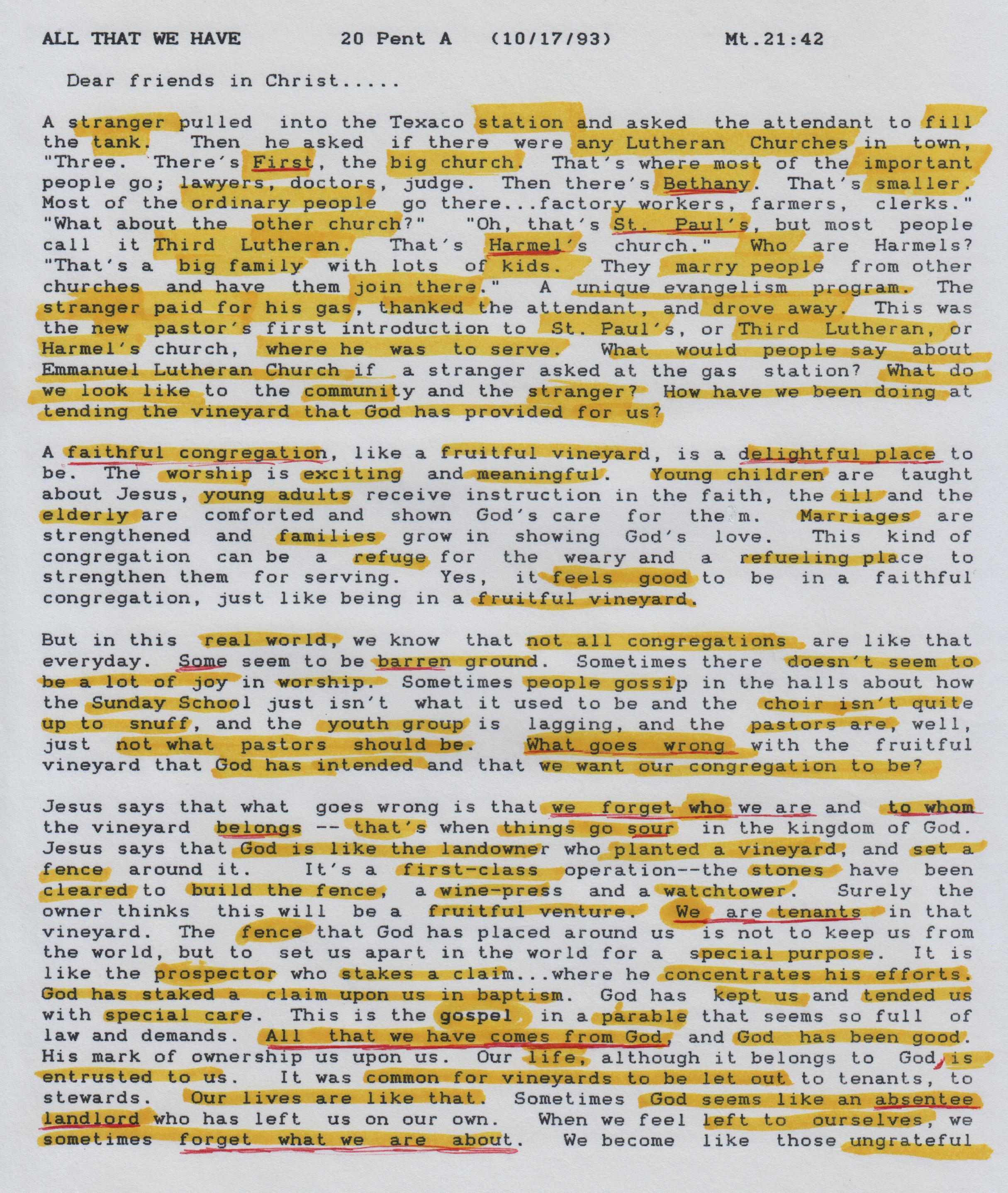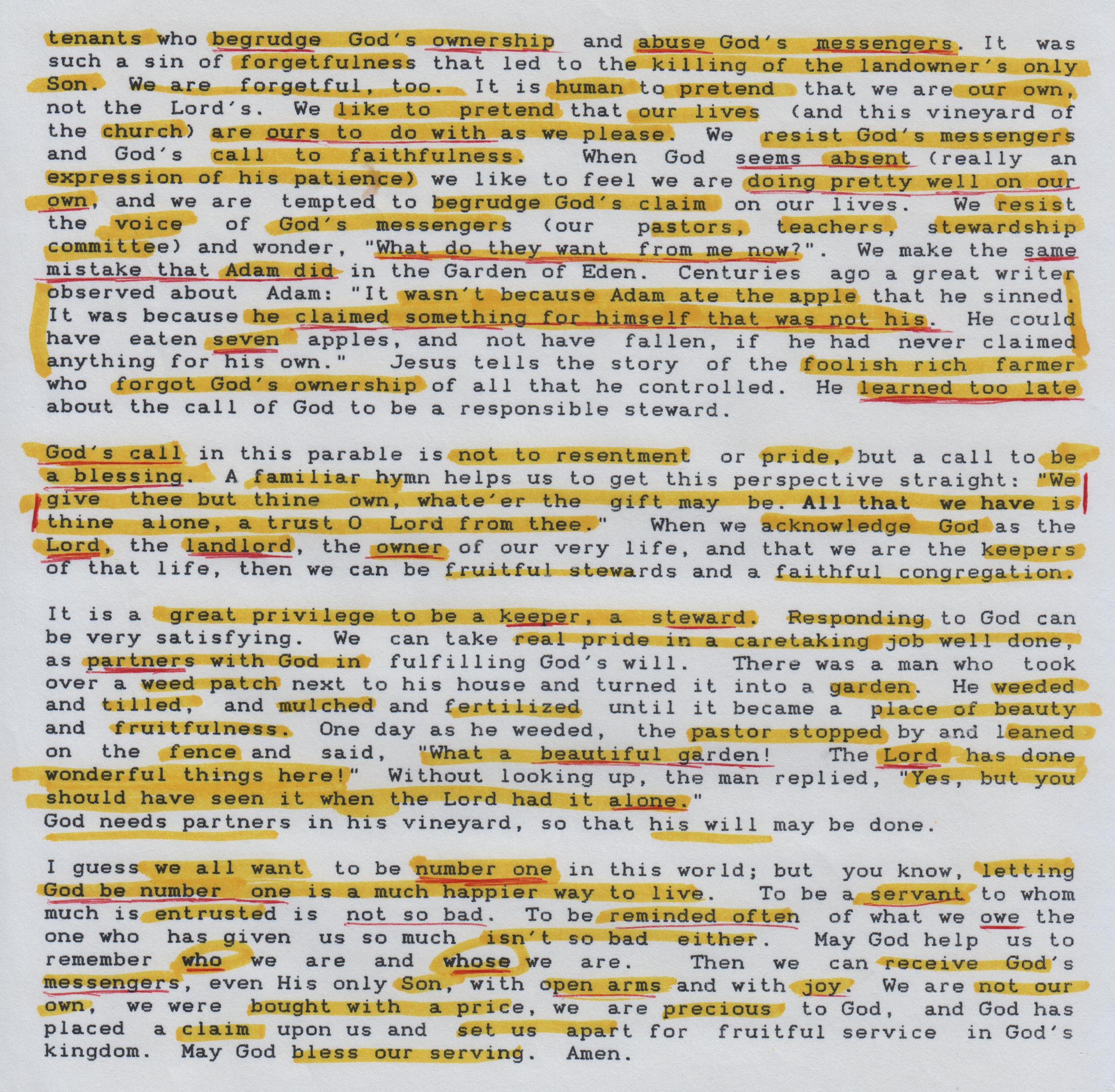Here is a sermon from 1993 that was printed, then highlighted in yellow and marked in red ink. There is a lot of discussion about vineyards, going along with the gospel reading from Matthew 21.
The sermon lists 20 Pent A as the season but the gospel now corresponds to the 19th Sunday After Pentecost in year A. I was able to use Google’s OCR to get the text from these images. Also, he refers to the lyrics of a hymn during the sermon which is called We Give Thee But Thine Own, so I posted a video of someone signing the hymn below the sermon text.
ALL THAT WE HAVE - 19 Pent A - 10/17/93


ALL THAT WE HAVE 20 Pent A (10/17/93) Mt.21:42
Dear friends in Christ…..
A stranger pulled into the Texaco station and asked the attendant to fill the tank. Then he asked if there were any Lutheran Churches in town, “Three. There’s First, the big church. That’s where most of the important people go; lawyers, doctors, judge. Then there’s Bethany. That’s smaller. Most of the ordinary people go there…factory workers, farmers, clerks.” “What about the other church?” “Oh, that’s St. Paul’s, but most people call it Third Lutheran. That’s Harmel’s church.” Who are Harmels? “That’s a big family with lots of kids. They marry people from other churches and have them join there.” A unique evangelism program. The stranger paid for his gas, thanked the attendant, and drove away. This was the new pastor’s first introduction to St. Paul’s, or Third Lutheran, or Harmel’s church, where he was to serve. What would people say about Emmanuel Lutheran Church if a stranger asked at the gas station? What do we look like to the community and the stranger? How have we been doing at tending the vineyard that God has provided for us?
A faithful congregation, like a fruitful vineyard, is a delightful place to be. The worship is exciting and meaningful. Young children are taught about Jesus, young adults receive instruction in the faith, the ill and the elderly are comforted and shown God’s care for them. Marriages are strengthened and families grow in showing God’s love. This kind of congregation can be a refuge for the weary and a refueling place to strengthen them for serving. Yes, it feels good to be in a faithful congregation, just like being in a fruitful vineyard.
But in this real world, we know that not all congregations are like that every day. Some seem to be barren ground. Sometimes there doesn’t seem to be a lot of joy in worship. Sometimes people gossip in the halls about how the Sunday School just isn’t what it used to be and the choir isn’t quite up to snuff, and the youth group is lagging, and the pastors are, well, just not what pastors should be. What goes wrong with the fruitful vineyard that God has intended and that we want our congregation to be?
Jesus says that what goes wrong is that we forget who we are and to whom that’s when things go sour in the kingdom of God. Jesus says that God is like the landowner who planted a vineyard, and set a fence around it. It’s a first-class operation–the stones have been cleared to build the fence, a wine-press and a watchtower. Surely the owner thinks this will be a fruitful venture. We are tenants in that vineyard. The fence that God has placed around us is not to keep us from the world, but to set us apart in the world for a special purpose. It is like the prospector who stakes a claim…where he concentrates his efforts. God has staked a claim upon us in baptism. God has kept us and tended us with special care. This is the gospel in a parable that seems so full of law and demands. All that we have comes from God, and God has been good. His mark of ownership us upon us. Our life, although it belongs to God is entrusted to us. It was common for vineyards to be let out to tenants, to stewards. Our lives are like that. Sometimes God seems like an absentee landlord who has left us on our own. When we feel left to ourselves, we sometimes forget what we are We become like those ungrateful tenants who begrudge God’s ownership and abuse God’s messengers. It was such a sin of forgetfulness that led to the killing of the landowner’s only Son. We are forgetful, too. It is human to pretend that we are our own,not the Lord’s. We like to pretend that our lives (and this vineyard of the church) are ours to do with as we please. We resist God’s messengers and God’s call to faithfulness. When God seems absent (really an expression of his patience) we like to feel we are doing pretty well on our own, and we are tempted to begrudge God’s claim on our lives. We resist the voice of God’s messengers (our pastors, teachers, stewardship committee) and wonder, “What do they want from me now?”. We make the same mistake that Adam did in the Garden of Eden. Centuries ago a great writer observed about Adam: “It wasn’t because Adam ate the apple that he sinned. It was because he claimed something for himself that was not his. He could have eaten seven apples, and not have fallen, if he had never claimed anything for his own.” Jesus tells the story of the foolish rich farmer who forgot God’s ownership of all that he controlled. He learned too late about the call of God to be a responsible steward.
God’s call in this parable is not to resentment or pride, but a call to be a blessing. A familiar hymn helps us to get this perspective straight: “We give thee but thine own, whate’er the gift may be. All that we have is thine alone, a trust O Lord from thee.” When we acknowledge God as the Lord, the landlord, the owner of our very life, and that we are the keepers of that life, then we can be fruitful stewards and a faithful congregation.
It is a great privilege to be a keeper, a steward. Responding to God can be very satisfying. We can take real pride in a caretaking job well done, as partners with God in fulfilling God’s will. There was a man who took over a weed patch next to his house and turned it into a garden. He weeded and tilled, and mulched and fertilized until it became a place of beauty and fruitfulness. One day as he weeded, the pastor stopped by and leaned the fence and said, “What a beautiful garden! The Lord has done wonderful things here!” Without looking up, the man replied, “Yes, but you should have seen it when the Lord had it alone.
God needs partners in his vineyard, so that his will may be done.
I guess we all want to be number one in this world; but you know, letting God be number one is a much happier way to live. To be a servant to whom much is entrusted is not so bad. To be reminded often of what we owe the one who has given us so much isn’t so bad either. May God help us to remember who we are and whose we are. Then we can receive God’s messengers, even His only Son, with open arms and with joy. We are not our own, we were bought with a price, we are precious to God, to God, and God has placed a claim upon us and set us apart for fruitful service in God’s kingdom. May God bless our serving. Amen.